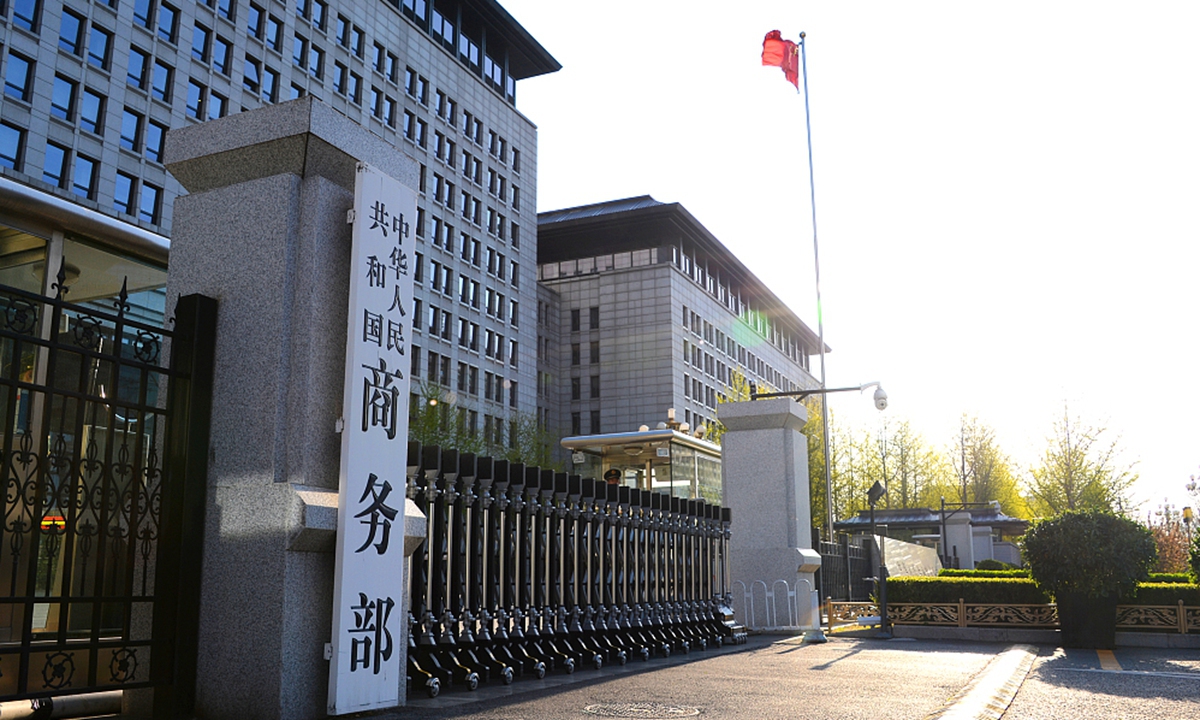Sanctioning Lockheed Martin, Raytheon no concern for other foreign-invested companies: MOFCOM

The Ministry of Commerce (MOFCOM) Photo: VCG
The sanctioning of two major US defense contractors, Lockheed Martin Corp and Raytheon Missiles & Defense, should not be a concern for other foreign-invested companies in China, as the country continues to improve its business environment and welcome foreign companies to invest, China's Ministry of Commerce (MOFCOM) said in a statement on Friday.
On Thursday, China added Lockheed Martin and Raytheon to its unreliable entities list, in what is the first case of the use of mechanism since its introduction in 2019.
The two US arms contractors face a ban on trade activities related to China and were told to pay fines totaling twice the amount of their arms sales to Taiwan island within 15 days or face increased penalties.
In the statement on Friday, an unnamed MOFCOM spokesperson said that the two US companies received the sanctions for participating in arms sales to the island of Taiwan.
The sales, which include offensive weapons such as missiles and jets, despite China's repeated and strong opposition, seriously undermined China's national security, sovereignty and territorial integrity. The arms sales seriously trampled on the one-China principle, the three China-US joint communiqués and added more risks to the cross-Straits situation.
"China lawfully prosecuted these entities, which through their unlawful wrongdoings seriously put China's sovereignty, security and developmental interests into harm's way," the spokesperson said.
The listing of the two firms is a normal enforcement activity in accordance with China's unreliable entities list mechanism, the spokesperson said, without clarifying further when asked whether the listing was connected with the recent US shooting down of a Chinese civilian airship over the Atlantic.
The spokesperson noted that the application of the unreliable entities list mechanism is strictly defined, and used against a very small number of unlawful foreign entities. The scope of the mechanism will not be randomly expanded and foreign-invested companies in China have no need for added concerns.
As stipulated by the 20th National Congress of the Communist Party of China and Central Economic Work Conference, China will welcome foreign compa-nies to further invest in China, with officials working to improve its business environment in a market-oriented, law-based and internationalized manner.
Dong Shaopeng, a senior research fellow at the Chongyang Institute for Finan-cial Studies at Renmin University of China, told the Global Times on Friday that the sanctions slapped on the two US arms contractors showed that China does not regard punishment as an unusable tactic in handling its commercial relations with foreign countries.
"It is a pragmatic and appropriate approach taken by China in shaping a stable, cooperative China-US relationship," Dong said. "Fighting back against offense is not only military thinking, but also applies to commercial matters."
It is also clear that this kind of punishment is reserved for peddlers of hegemony like Lockheed Martin and Raytheon, who have touched China's legal bottom line, Dong said. The vast majority of foreign companies can count on resolving business and trade disputes via legal means and friendly communication, and China still welcomes foreign companies to tap into its vast market.
The Chinese action is in compliance with WTO rules, the spokesperson said, noting that China will continue to support multilateral trade mechanisms, free trade and promote the sound development of the global economy.
Bai Ming, deputy director of the International Market Research Institute at the Chinese Academy of International Trade and Economic Cooperation, told the Global Times on Friday that the statement on Friday drew a red line.
"However, foreign companies that operate normally should not be concerned with the entity list, as its sphere is clearly defined," Bai said.
Shares of Lockheed Martin dropped 1.93 percent while Raytheon's slid down 0.48 percent at the New York Stock Exchange on Thursday.
In February 2022, following an arms sales deal, China's Foreign Ministry an-nounced countermeasures against the two firms with relevant stipulations in China's Anti-Foreign Sanctions Law, another mechanism for punishing foreign entities that harm China's sovereignty and security interests.
Some Republicans on US Congress pressed Democratic President Joe Biden on Thursday to include $2 billion in military assistance grants for Taiwan island in his upcoming budget request, according to Reuters.

